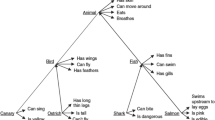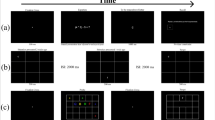Abstract
Data from three experiments are reported in which recognition memory for active and passive sentences is compared. The results consistently show no difference, a result taken to invalidate syntactic memory hypotheses (e.g., the kernel plus tag and markedness hypotheses) which assume that the stored representation of passive sentences is more complex than that of active sentences. Previous reports of superior recall of active sentences are attributed to a reconstructive bias. One form of propositional hypothesis and a verbatim hypothesis are consistent with the data.
Similar content being viewed by others
References
Anderson, J. R. (1974). Verbatim and propositional representation of sentences in immediate and long-term memory.J. Verb. Learn. Verb. Behav. 13: 149–162.
Anderson, J. R., and Bower, G. H. (1973).Human Associative Memory, Winston and Sons, Washington, D.C.
Anisfeld, M., and Klenbort, I. (1973). On the functions of structural paraphrase: The view from the passive voice.Psychol. Bull. 79: 117–126.
Bregman, A. S., and Strasberg, R. (1968). Memory for the syntactic form of sentences.J. Verb. Learn. Verb. Behav. 7: 396–404.
Carpenter, P. A. (1974). On the comprehension, storage, and retrieval of comparative sentences.J. Verb. Learn. Verb. Behav. 13: 401–411.
Clark, H. H. (1969). Linguistic processes in deductive reasoning.Psychol. Rev. 76: 387–404.
DeVito, J. A. (1969). Some psycholinguistic aspects of active and passive sentences.Quart. J. Speech 55: 401–406.
Fillenbaum, S. (1966). Memory for gist: Some relevant variables.Lang. Speech 9: 217–227.
James, C. T., Thompson, J. G., and Baldwin, J. (1973). The reconstructive process in sentence memory.J. Verb. Learn. Verb. Behav. 12: 51–63.
Martin, E., and Roberts, K. H. (1966). Grammatical factors in sentence retention.J. Verb. Learn. Verb. Behav. 5: 211–218.
Mehler, J. (1963). Some effects of grammatical transformations on the recall of English sentences.J. Verb. Learn. Verb. Behav. 2: 346–351.
Miller, G. A. (1962). Some psychological studies of grammar.Am. Psychologist 17: 748–762.
Perfetti, C. A. (1969). Sentence retention and the depth hypothesis.J. Verb. Learn. Verb. Behav. 8: 101–104.
Prentice, J. L. (1966). Response strength of single words as an influence in sentence behavior.J. Verb. Learn. Verb. Behav. 5: 429–433.
Roberts, K. H. (1968). Grammatical and associative constraints in sentence retention.J. Verb. Learn. Verb. Behav. 7: 1072–1076.
Sachs, J. S. (1967). Recognition memory for syntactic and semantic aspects of connected discourse.Percept. Psychophys. 2: 437–442.
Wanner, H. E. (1968). On remembering, forgetting and understanding sentences: A study of the deep structure hypothesis. Unpublished doctoral dissertation, Harvard University.
Wearing, A. J. (1970). The storage of complex sentences.J. Verb. Learn. Verb. Behav. 9: 21–29.
Author information
Authors and Affiliations
Additional information
This research was supported by Grant MH 19859 from NIMH to the first author, and by Rutgers University Research Council grants to both authors.
Rights and permissions
About this article
Cite this article
James, C.T., Abrahamson, A.A. Recognition memory for active and passive sentences. J Psycholinguist Res 6, 37–47 (1977). https://doi.org/10.1007/BF01069573
Received:
Issue Date:
DOI: https://doi.org/10.1007/BF01069573




